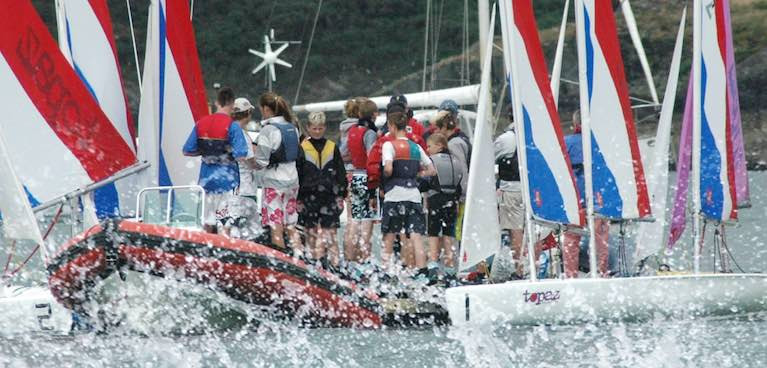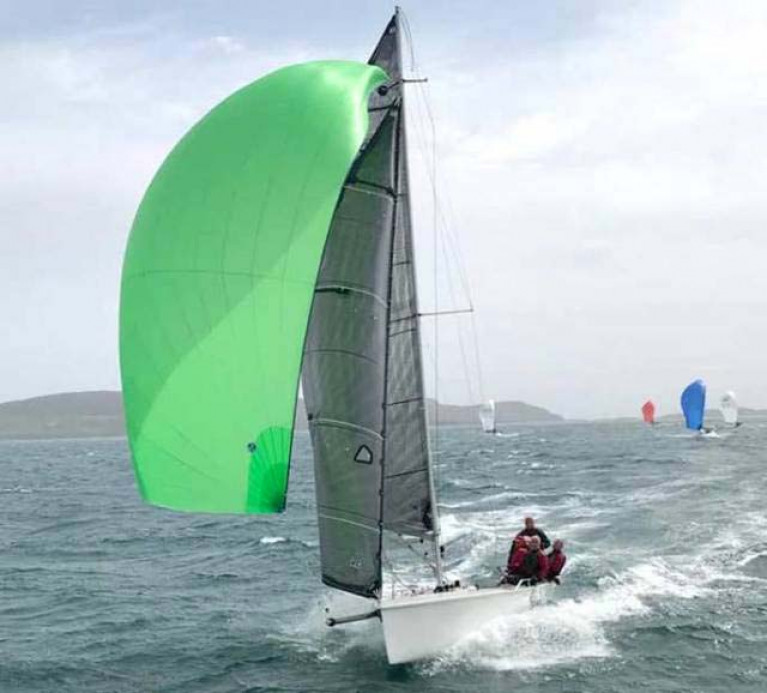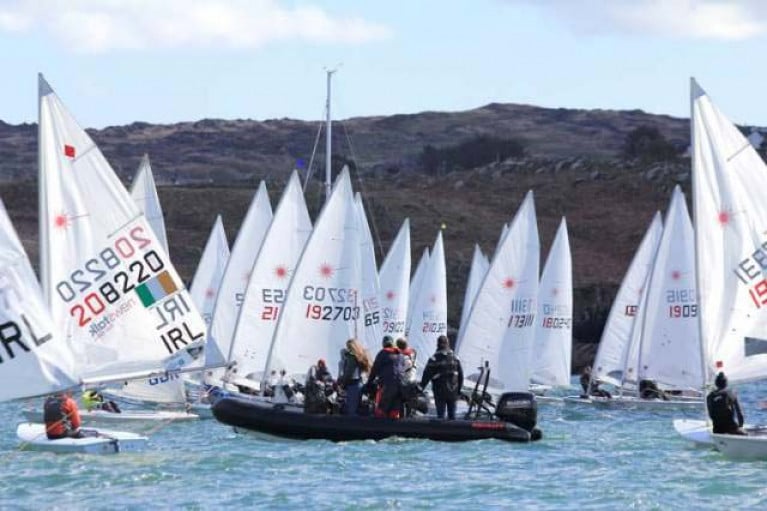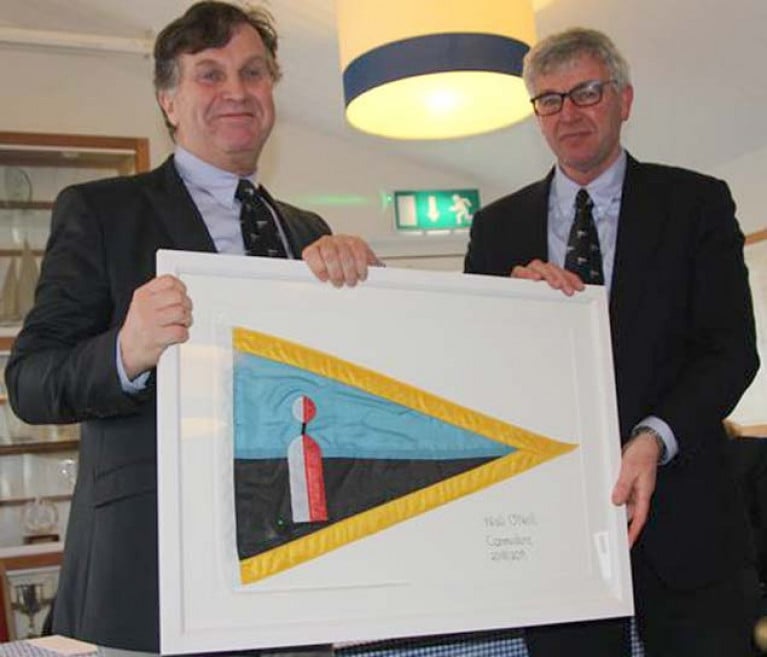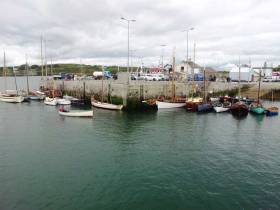Displaying items by tag: Baltimore Sailing Club
ILCA Sailors Compete in Munster Championships with Over 100 Boats Represented in Baltimore
For ILCA sailors Easter always means the Munster Championships in Baltimore Sailing Club in West Cork. Despite the early Easter this year the Munster Championships lived up to all expectations, with nearly a hundred boats travelling from around the country, all three ILCA fleets were very well represented.
Saturday brought a fresh Southerly 18 to 22 knots, with a rolling swell entering the harbour from below the beacon. Race Officer Ciaran McSweeney laid a trapezoid course with ILCA 4 and 6 racing on the inner loop and ILCA 7 on the outer loop. Three races were planned for each day, with an option of a fourth on day one. For once, all fleets got off the line without a general recall, which is a testament to an excellent course and line set by McSweeney’s team.
In the ILCA 4, Patrick Foley got off to a great start with 1, 1, 5. Riona McMorrow Moriarty was not far behind with a consistent 3,3,3 and Caoilinn McDonnell was in the mix with 4, 6, 1.
In the ILCA 6 Bobby Driscoll was untouchable with three bullets, close behind was Lewis Thompson 5,2,2 and Sam LeDoux 3,4,3. Hugh Delap led the Masters division with 11,10,11 and Philip Doherty lay second with14,13,13.
 Royal St. George sailors from Dublin Bay preparing for day two of the ILCA Munster Championships in Baltimore, West Cork
Royal St. George sailors from Dublin Bay preparing for day two of the ILCA Munster Championships in Baltimore, West Cork
Tom Coulter and Fiachra McDonell were battling it out at the front of the ILCA 7 fleet after their recent return from the U21 European Championships. Tom scored a 2,1,1. Fiachra was not far behind with 1,4,2, followed by Jonathan O’Shaughnessy with 4,2,4. Conor Byrne 5,6,3 and Colin Leonard 6,3,5 led the Masters.
Day 2 brought very different conditions with a shifty North Easterly breeze ranging from 15 to 8 knots. The Race Officer’s team set the course through the harbour and kept races to an ideal 45 to 50 minutes. With big shifts hitting either side of the course and the lousy rocks in the middle, it paid to pick a side, but whether to go left or right was anyone’s guess.
ILCA 4 overall winner Riona McMorrow Moriarty showed consistency across conditions with a 3,1,1 on day two, scoring top three results in all six races. Caoilinn McDonnell finished second with 7,5,3 and Patrick Foley third with 8,9,10.
In the ILCA 6, Bobby Driscoll started well with another bullet but scored a 15 in race two, which he was able to discard with a 3 in race six. Sam LeDoux had an excellent second day with 2,4,1 taking second place overall and Lewis Thompson finished in third with a 7,1,21. Hugh Delap led the Masters with 12,7,6 and Conor Barry finished as second master with 2,12,17. Special mention to Masters sailor Brendan Hughes who led the fleet in race 6 for the first two laps, the youth sailors were never far behind but it shows the quality throughout the fleet and the fact the ILCA is a boat for all age groups.
With tensions high and a slight current pushing the fleets over the line the ILCA 7’s were called for a general recall in race 4, but got away on the second attempt. Tom Coulter had an outstanding day two with a 1,1,9. Fiachra McDonnell finished second overall with a 7,2,6 and Fionn Lyden took third with 5,6,2. Conor Byrne 2,5,7 finished as the top Master on joint points with Lyden after six races. After a black flag in race 6, Colin Leonard finished as second Master with 3,10, BFD.
ILCA Ireland’s next event is the Connaught Championships taking Place in Lough Ree Yacht Club on the 27th and 28th of April. Registration and the ILCA event calendar is here
Fionn Lyden's 'Spiced Beef' is 1720 Baltimore Cup Winner
Fionn Lyden's 'Spiced Beef' of the host club was the overall winner of the weekend's 1720 Baltimore Cup raced under the burgee of Baltimore Sailing Club in West Cork.
Lyden built on his overnight lead to be six points clear of clubmate Rob O'Leary's Dutch Gold crew after six races sailed and one discard on Sunday.
Racing took place in a stiff northwesterly breeze, with the Lousy Rocks in Baltimore Sound playing a significant role in splitting the fleet in race three of the Cup on Saturday afternoon.
Nick Walsh's Breaking Bad was third on 25 points in the 16-boat fleet.
Next up in the West Cork sailing scene is Schull Harbour's four-day Calves Week Regatta which starts on Tuesday, August 8th, with a capped 70-boat cruiser-racer fleet.
Baltimore Hosts 2022’s 1720 Nationals Next Month
Baltimore Sailing Club will play host to this year’s 1720 Nationals from Thursday 8 to Saturday 10 September.
Registration will take place Wednesday 7th September from 5-8pm and on the following morning from 9-10am.
The entry form and Notice of Race are now available, with the Sailing Instructions to follow closer to the event. See the Baltimore SC website for more.
Baltimore Sailing Club Bringing Young Sailors into 1720 Sportsboats
Baltimore Sailing Club in West Cork is, predominantly, a ‘summer club’ that is very busy when seasonal visitors arrive in the village from Cork City, Dublin and other locations. That does not limit its ambitions to develop the sport as its newly-elected Commodore Grahame Copplestone has been telling me.
The annual general meeting this week had a list of planned events that it hopes to host, starting in April and this year running possibly into October/ November. The list includes Munster Lasers – 16th-17th April; Wazsp Southerns/Foil Event – 14th – 15th May; National 18’s South Coast – 4th -5th June; 1720 Nationals – 1st, 2nd 3rd August or 8th, 9th 10th August; Baltimore Cup – August weekend; ITRA Nationals –late October/November.
 1720 sportsboats are strong in Baltimore Sailing Club where class ace Robert O'Leary (left) is the club Sailing Secretary Photo: Deirdre Horgan
1720 sportsboats are strong in Baltimore Sailing Club where class ace Robert O'Leary (left) is the club Sailing Secretary Photo: Deirdre Horgan
Grahame Copplestone takes over from outgoing Commodore Charlie Bolger who has agreed to stay on as a club committee member. Peter O’Flynn has been appointed as Vice Commodore; Tom Bushe – Treasurer; Etain Linehan – Secretary; Sheila O’Sullivan – Rear Commodore; Rob O’Leary – Sailing Secretary, with Committee Members - Ruth Field, Dee Griffiths, Pierce Ryan, Glenn MacCarthy and Fiona MacCarthy.
"The 1720 Class has become a major part of the club"
The 1720 Class has become a major part of the club and owners of these boats are encouraging a “cohort of younger sailors to join the fleet,” the new Commodore says. He told me that the club is putting a lot of emphasis on retaining younger sailors in the sport and is also intending to develop more cruiser racing.
 The Heir Island Sloop raced at Baltimore Sailing Club is designed for local one-design racing and day sailing on the semi-sheltered waters of Long Island Bay and Roaring Water Bay in South West Cork
The Heir Island Sloop raced at Baltimore Sailing Club is designed for local one-design racing and day sailing on the semi-sheltered waters of Long Island Bay and Roaring Water Bay in South West Cork
Graham Copplestone is my first podcast guest in 2022. Listen to his interview here where he outlines in detail the club plans, starting with its position as a summer club.
HSE COVID-19 guidelines have impacted Baltimore Sailing Club's popular sailing courses in West Cork this week.
In an 'Important Sailing Course Announcement', the club says it is not running courses today and tomorrow (Tuesday, 6th July).
A statement on the club website dated July 4th, says "As you are aware there are positive COVID-19 cases in the Baltimore area". As a result, the club says it is following "HSE guidelines and so are not in a position to run the sailing course".
The club committee says "we are constantly reviewing the situation and will be in contact again on Tuesday about the rest of the week".
Earlier, on July 2nd, the club announced that a "significant number of our instructors have been deemed a close contact of a positive Covid-19 case".
It added, "due to the procedures that the club has set up and in accordance with HSE guidelines and HSE advice received today, the children on the course are not deemed close contacts".
The BSC Committee says the "priority remains the safety of the children, helpers, instructors, club volunteers and local community. We hope to be back sailing very soon".
See the Baltimore Sailing Club website here.
Baltimore Sailing Club to Adjourn December AGM in Hope of 'in Person' Meeting Next March
There will only be one item on the agenda when Commodore Charlie Bolger opens Baltimore Sailing Club's agm on December 31st and that's the adjournment of the meeting.
The West Cork club's agm is traditionally held at the end of December but due to Covid 19 restrictions, it is unable to be held this year.
Bolger aims to open then adjourn Friday's pow-wow in the hope that it will be able to hold an 'in person' AGM before 30th March 2021.
In a notice to members, the Commodore says "We are allowed to have the AGM 15 months after the previous AGM" and in the hope that we may be able to have an “in person” AGM before 30th March 2021 we propose to open and adjourn the AGM by zoom on 30th December at 11:00 am.
Baltimore Sailing Club will be hoping for the same conditions that graced last year's West Cork race track when the 1720 sportsboat fleet returns for its National Championships from 25 – 27 September 2020.
As Afloat reported last September, a buoyant 20-boat fleet contested the championship in 2019 won by the host club's Robert O'Leary with six top-five results from eight sailed including three race wins.
A Notice of Race – will be published in due course.
Irish Laser Association and Baltimore Sailing Club in West Cork have decided that it will not be possible to hold the Munster's in compliance with current advice issued from HSE.
It is not possible to run an event of this size and comply with separation protocols on the shore, and although these are currently in place until 29th March, Baltimore SC and Irish Laser Association have taken the decision now to postpone the event, giving everyone as much notice as possible.
Details of the rescheduled event will follow on Afloat in due course
Baltimore Sailing Club - 'A Very Special Club'
In describing its history Baltimore Sailing Club in West Cork says of itself that “the exact year of the foundation of Baltimore Sailing Club is somewhat uncertain!”
Above the bar, in the impressive clubhouse which was constructed in the past few years is the formal list of Commodores. It starts in 1952. However, Frank Murphy, who was the first Secretary of the club, stated that it was founded in the Summer of 1953. The ‘Minutes’ of a meeting held at Salters in Baltimore on Saturday, July 28, 1956 state that “it was unanimously felt that a Sailing Club should be formed.” The club premises had originally started in Salter’s Shed in the harbour.
“There was dinghy sailing in Baltimore before 1953 and since the official list of Commodores starts in 1952, this should be the start year,” the club history says. I love the approach of Baltimore SC in the way that is put!
Its outgoing Commodore, Niall O’Neill, described Baltimore as “a very special club” when he summed-up his two years at the helm. “The spirit” evident amongst all members in the running of the club and the organisation of the events it holds is at its heart. At the annual general meeting this week the Vice Commodore, Charlie Bolger, took over as the new Commodore and joined me for my podcast this week:
The annual general meeting elected Grahame Copplestone as new Vice Commodore with the Committee of Tony Connolly, Rob O’Leary, Grahame Copplestone, Tom Bushe, Sheila O’Sullivan, Dee Griffiths, Etain Linehan, Deirdre Horgan and Ruth Field. The Commodore’s Trophy was awarded jointly to Dee Griffiths and Deirdre Horgan for their contribution to the organisation of various club activities and initiatives during the year. The Heir Island Sloop overall trophy was awarded to Declan Tiernan and Marty O’Driscoll; 2nd – Frank and Helen Whelton; 3rd – Cormac O’Hanlon. The 1720 fleet, for which Baltimore is a major event centre, was won overall by efolioaccounts, Tom, Neil and Paul Hegarty; 2nd Déjà vu, Ross and Rory Johnson; 3rd “Two To Tango,” Peter O’Flynn. The “John Daly Perpetual Trophy” for the most improved junior sailor was awarded to Richard Buckley.
Baltimore People Want to Build on Wooden Boats Success
A revival of interest in the traditional working craft of West Cork started in Baltimore in 1997 with the construction of the Noble Shamrock, a 33-foot long mackerel yawl built by Hegarty’s Boatyard at Old Court.
This was done from measurements taken from one of the last surviving hulls of her type, the Shamrock that was built in Baltimore in 1910. Three other craft of this type were built over the next few years.
Traditional 25-foot Heir Island Lobster Boats have also been built. In 1999 the last remaining boat of this type, the Hanora, built in 1893, was rescued, restored by Hegarty’s yard and re-launched in May 2014. Hegarty’s is the yard which restored the ILEN, Ireland’s last trading schooner, that recently sailed to Greenland.
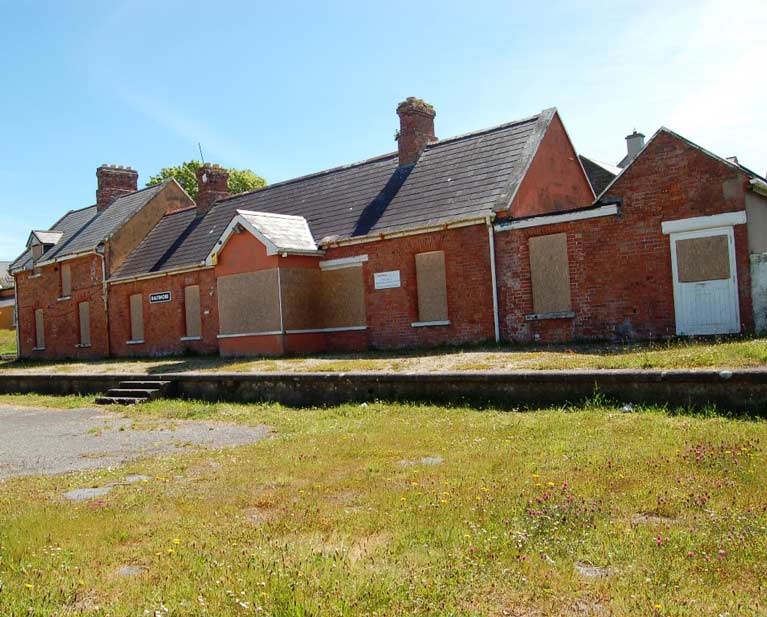 The disused Railway Station at Baltimore
The disused Railway Station at Baltimore
Baltimore Wooden Boat Festival has become a national success. It includes shipwrights and maritime archaeologists amongst its organising committee.
With this has come the plan by CUAS, the West Cork Maritime Heritage Company formed by the village community, to turn the disused former railway station into a Museum of Maritime Heritage, with hands-on activities, teaching traditional boat building and sailing skills, maritime archaeology and rescuing and conserving traditional West Cork craft.
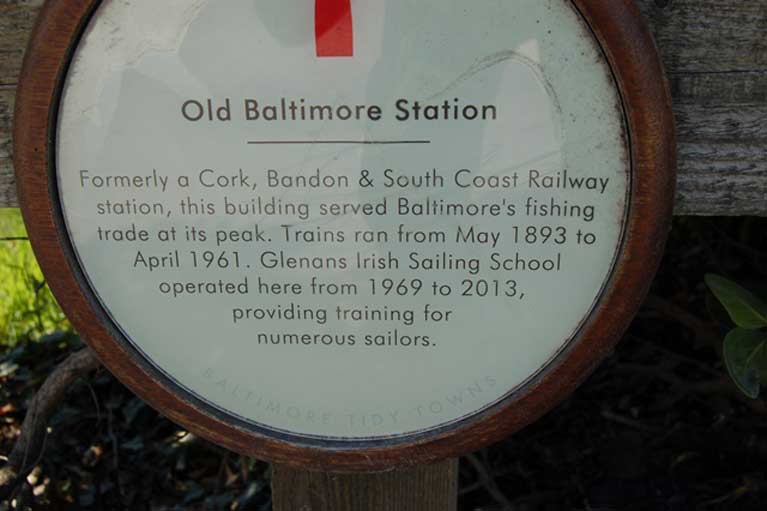 Baltimore Railway Station sign
Baltimore Railway Station sign
That station, a brick building, was once the most southerly railway station in Ireland when it served the thriving fishing village that Baltimore was. It opened in May 1883, but was closed in April 1961.
It was a base for Glenans sailing operation until 2013 but, unused since, has become the target of vandalism.
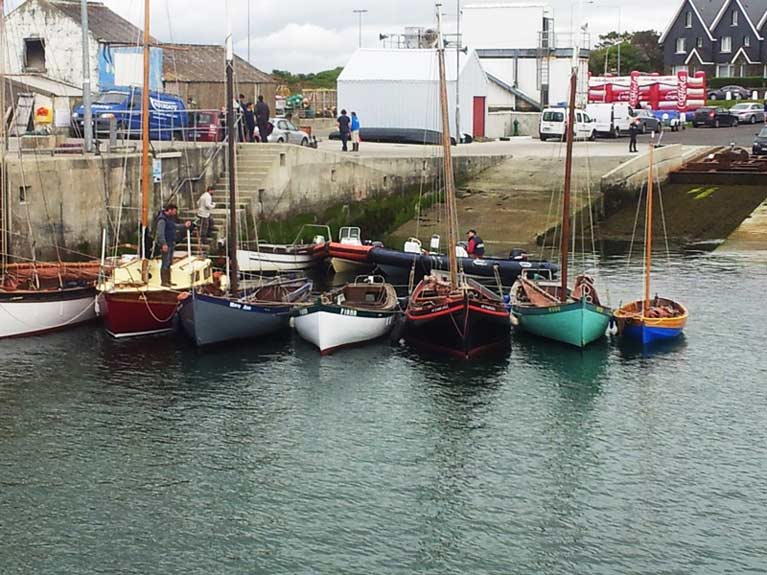 Baltimore Wooden Boats Festival
Baltimore Wooden Boats Festival
It is owned by Failte Ireland, but the local community group is frustrated. At first large amounts of money were being sought for the building. It managed to stop attempts to sell the station, pointing to the benefits which its plan to preserve West Cork’s maritime heritage would have.
Falite Ireland eventually agreed to hand over the building to Cork County Council, with the intention that the community group, CUAS, would turn it into the centre. CUAS says it is confident it can do this. But Fáilte Ireland has still not given a date when it will hand over the building.
A request to Fáilte for information was not answered.
CUAS says they are showing commitment by local people to their area and its maritime heritage in a “determined, positive way”.
It seems time that Fáilte Ireland would respond equally positively.



























